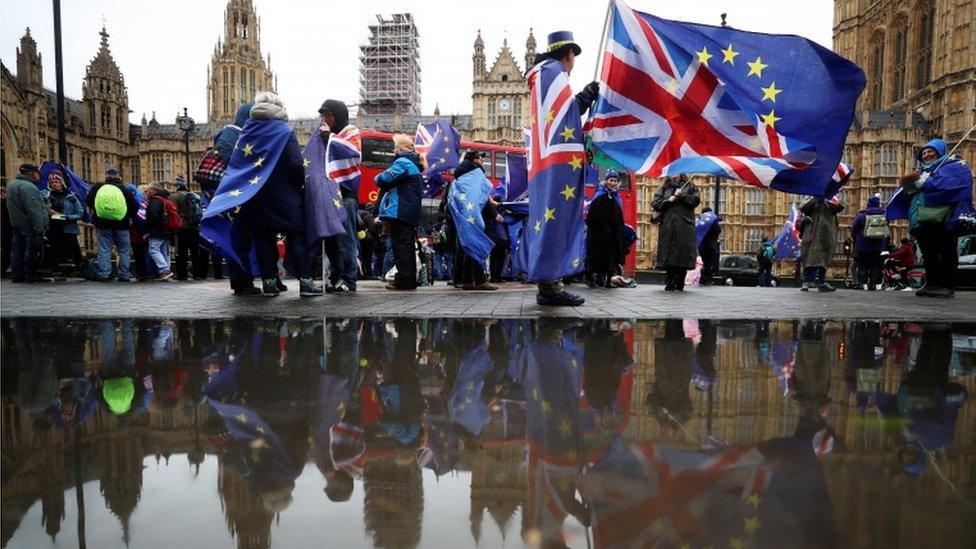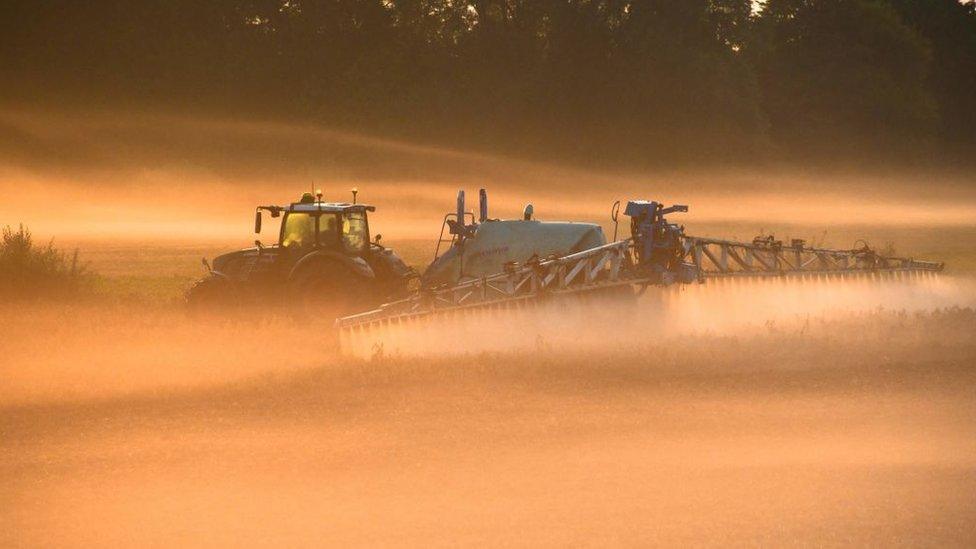Week ahead in Parliament
- Published
- comments

It's a short, three day, week, when the parliamentarians return to Westminster, but you can bet they'll pack a lot in.
So how has an eventful conference season reshaped the political landscape?
Well, to coin a phrase: "Nothing has changed."
The PM's dance routine and conference speech have not altered her strategic problem in the Commons; that whichever Brexit option she presents to MPs, enough Conservatives could, quite possibly, jump ship, to defeat it.
What sticks in my mind is the huge queue for the Boris Johnson fringe meeting at the Conference, and the visceral roars that greeted his appeal to "Chuck Chequers".
And it's not just Chequers. Brexiteers expect that to be watered down still further. Now they fear Britain being frozen in the single market for an interminable transition period, or even an attempt (perhaps a backbench motion with Labour connivance) to request a postponement of Brexit day.
The looming crunch point now is the next EU council in a couple of weeks. If the prime minister is still proposing some Chequers variant, Brexiteers rumble about forcing a confidence vote, and insist that even if she won, her position would be untenable. They talk of having nothing to lose by throwing all the cards in the air.
The Labour conference offered the PM little Brexit comfort - Jeremy Corbyn's offer of support for a studiously vague "sensible Brexit deal" was in the Leninist tradition "as a rope supports a hanging man".
Theresa May was being invited to pass a soft Brexit deal, probably including membership of "a" customs union, in the teeth of the wishes of most of her MPs; it would shatter the Tories' already strained unity.
Otherwise, the speech by the shadow Brexit Secretary, Keir Starmer, simply underlined that Labour are poised to vote against Chequers and pretty much any other deal the PM might reach, in the expectation that one Tory faction or another would join them in the lobbies.
And the point here is that they do not need to do so in droves, so weak is the government's parliamentary position, especially given that their relationship with their DUP allies now looks fractious.
The coming week will see the preliminary stratagems. Positions will be set out and Conservative factions will be on manoeuvres. PMQs, in particular, could provide the prime-time stage for some of that - as well as possible friendly fire from irate Tory backbenchers: watch out for any questions from the DUP's Westminster Leader, Nigel Dodds, until now a key prop of the government's Commons majority.
And keep an eye on attempts to woo the small but strategically significant band of Labour Brexiteers - whose votes might just tip the balance back the government's way.
Equally any statement from the PM or Brexit Secretary Dominic Raab on the government's post Salzburg negotiating position should provide a tense, testy trial of strength, with all these factors in play.
Against all that, the published agenda for the coming week looks quite tame - but here's my rundown:
Tuesday 9 October
The Commons reconvenes (2.30pm) for Justice questions. After that, expect the usual crop of post-break ministerial statements and urgent questions.
There will likely be an update on the Brexit talks; there could be a statement on the new immigration policy set out by Sajid Javid - especially given that the new immigration system needs to be in place for Brexit day; or on Russia; or on the new cancer strategy announced by the PM in her conference speech.
And there will probably be other matters, too. It's always a tell-tale sign that day's scheduled debates could be squeezed a bit to make room....
Then Labour MP Alex Norris has a Ten Minute Rule Bill to make assaults on retail workers an aggravated offence, attracting a tougher sentence in the courts.
Those main debates are on two very important backbench motions. The first is on Baby Loss Awareness Week, external - the Conservative, Antoinette Sandbach, who has spoken movingly about the loss of her own child secured this debate to mark the week when bereaved parents, friends and family commemorate their babies' lives.
She wants this debate to focus on key developments including the government decision to bring forward the target to halve the rate of stillbirths, neonatal and maternal deaths, and brain injuries by 2025. She also wants to highlight the national bereavement care pathway, which has been launched in 11 pilot sites, and which will eventually be rolled out across England - and discuss what can be learned from the different system in Scotland.
Then, the Conservative former children's minister, Tim Loughton, now chair of the all-party group for children, leads a debate children's social care in England. The aim is to focus on the recommendations of Storing up trouble: a postcode lottery of children's social care, external - the APPG's report on the state of children's social care.

The report found that vulnerable children face a postcode lottery in thresholds of support, and that they often have to reach crisis before social services step in. Mr Loughton says that children's social care is often below the radar in the Department for Education, where he was a minister. He wants the debate to cover safeguarding, child neglect, child health issues and local authority funding priorities.
The adjournment, led by Sir Geoffrey Clifton-Brown, the senior Conservative on the Public Accounts Committee, is on a cause that seems likely to resurface at regular intervals; reforming the business rates system for small retail businesses, to help save high street traders.
Subjects debated in Westminster Hall include: the future of the oil and gas industry (11.30am); anti-social behaviour in Hull and the East Riding of Yorkshire (1pm); investigation of business banking fraud (4.30pm); and the cost of school uniforms (where Work and Pensions Committee Chair Frank Field plans what he's billing as an Ernie Bevin-style demonstration of the cost of school uniforms to people in benefits (6pm).
The one to watch, though, may well be the Labour MP Gareth Snell's debate on tackling modern-day slavery. He will argue that despite the hosannas that greeted the passage of the Modern Slavery Act,, external it has proved toothless - particularly section 54 on transparency in supply chains, which is supposed to spur companies into ensuring that their products are not manufactured in whole or part by slaves.
The idea is feed into the independent review of the Modern Slavery Act launched by the Home Office and led by former minister Frank Field and Maria Miller MP and the retired judge, Baroness Butler-Sloss. Victoria Atkins, Home Office minister for crime, safeguarding and vulnerability will respond for the government.
In the Lords (2.30 pm) the main business is the second reading debate on the Counter-Terrorism and Border Security Bill, external, which aims to give the police, security services, prosecutors and judiciary, new powers to tackle the evolving threat to the UK from terrorism and from hostile state activity.
These include new powers to stop, question, search and detain people at ports, airports and the Northern Ireland border; "more rigorous management" of convicted terrorists after their release from custody; to make it an offence to express an opinion or belief that is supportive of a proscribed organisation in certain circumstances and to strengthen the existing offence of downloading terrorist material.
The civil liberties campaign group Liberty has warned that the bill aims to criminalise information-seeking and the expression of opinion, even when there is no intention to do harm or commit actual terrorism - and, on past performance, the phalanx of retired judges and civil liberties lawyers in the upper house can be expected to propose detailed amendments.
The Commons removed the heavily-criticised 'three clicks' rule for streaming material, and improved the 'reasonable excuse' defence for accessing material.
But for some critics, these changes don't solve the problem, so the issue seems certain to be revisited in Lords.
Another concern is the 'designated area' provision which would make it an offence for UK nationals to visit areas like terrorist havens. This was added at last minute in Commons - and Labour promises to ensure full scrutiny in the Lords. Otherwise, Labour is broadly supportive of the bill, especially after a series of concessions made in the Commons on reviewing the Prevent programme and making membership of EU Arrest Warrant a negotiating objective.
Wednesday 10 October
The Commons opens (11.30am) with International Development questions, as a brief appetiser for the High Noon clash that is Prime Minister's Questions.
The day's Ten Minute Rule Bill, from the Conservative former cabinet minister, Theresa Villiers, is the Criminal Records (Childhood Offences) Bill. It aims to ensure that people's lives are not blighted by minor offences, "some silly adolescent scuffle", for example, in adult life. At the moment such records can prevent people getting jobs in the NHS or schools, as well as plenty of other occupations. So she wants to limit what has to be disclosed to very serious offences.
Then comes the second reading of Michael Gove's Agriculture Bill, external - pretty much the first major Brexit measure concerned with policy rather than process.

This is billed as the biggest overhaul of UK farm policy since 1945 - it would abolish direct subsidies to farmers in England and replace them with new payments for "public goods" like improvements in soil, air and water quality, protection of wildlife habitats, public access to the countryside, flood prevention and reduction of carbon emissions.
But the bill has attracted criticism from the famers' umbrella body, the NFU, which warns against a policy which ignores food production.
The adjournment debate, led by south London Labour MP, Vicky Foxcroft, is on the role of youth services in tackling youth violence.
In Westminster Hall, debates include the sustainability of the nursery sector (9.30am); consumer protections for new central heating installations (11am); asylum accommodation contracts (2.30pm); Universal Credit split payments (4pm) and promoting economic growth in the East of England (4.30pm).
On the Committee Corridor, watch out for the Public Accounts hearing (2.30pm) on the politically charged issue of police finance, in the wake of this highly critical National Audit Office report, external.
The NAO warned that the Home Office's decision to take a "light touch" approach to overseeing police forces meant it did not understand the impact of £2bn cuts on local policing. The committee will look at how the Home Office should monitor police authorities for signs of financial stress.
Also worth watching may be the Digital, Culture, Media and Sport Committee's hearing on the emerging threat to live music venues, featuring Ben Lovett of Mumford and Sons (2.30pm).
In the Lords (3pm) peers polish off the detail of the short, uncontroversial Non-Domestic Rating (Nursery Grounds) Bill - a "tiddler bill" to deal with the ramifications of a Supreme Court judgement, and then move on to the second reading of the Tenant Fees Bill,, external which aims to ensure tenants are only required to pay their rent and deposit when securing a private rented property, abolish most upfront fees and cap security deposits at six weeks' rent.
Thursday 11 October
The Commons opens (9.30am) with Transport questions, followed by Business questions to the Leader of the House, Andrea Leadsom.
The day's main debate is a taking of voices on the Victims Strategy, the government's plan to boost support for victims in the justice system- including victims of terrorism and child sexual abuse.
It includes an overhaul of the Criminal Injuries Compensation Scheme. There is still pressure for changes beyond those proposed by the government, including more protection of victims from unfair cross-examination during trials.
In Westminster Hall (1.30pm), Conservative Simon Clarke and ex-Labour, now independent, Frank Field, lead a debate on freeports, which, they believe, could provide a post-Brexit dividend for coastal and port communities.
Goods could arrive at a freeport, be assembled there as part of a manufacturing process and re-exported without paying duty, thus providing an incentive to onshore jobs back into the UK, if they become more competitive relative to overseas producers.
In the Lords (11am) look out for the Labour peer, Lord Dubs' backbench debate on the impact on the Good Friday Agreement of the UK's withdrawal from the EU - which could turn out to be rather well-timed. That's followed by another Labour backbencher, Lord Bragg, on the impact on the arts of the UK's withdrawal from the EU.
Neither House sits on Friday.
